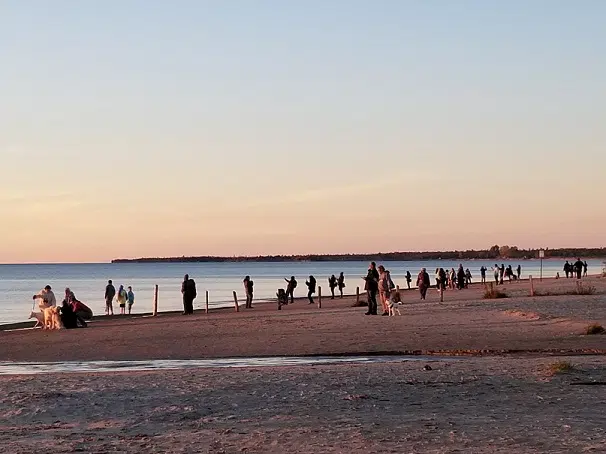Saugeen First Nation Chief Conrad Ritchie says his community continues to move forward with its plans for a portion of Sauble Beach after a judge declared it belongs to the First Nation.
The Town of South Bruce Peninsula is appealing that decision, citing a desire for clarification over the eastern boundary between First Nation land and Town land.
- Court Rules In Favour Of Saugeen First Nation In Sauble Beach Boundary Claim
- Town Plans To Appeal Sauble Beach Court Decision
- Sauble Beach Court Ruling Raises Questions, Town of South Bruce Peninsula Says
- First Nation Reacts To Town’s Intention To Appeal Court Decision
But Chief Ritchie holds an optimistic view for the future of the beach, and says he doesn’t foresee a restriction on public access.
He says, “We had hoped that Ontario and the Town would have respected the decision as well. It’s up to the Town if they wish to appeal, but we’re pretty confident that the Court of Appeal will also confirm our right, just as Justice Vella did.”
He continues, “Even though they filed the appeal to the court, the decision was still effective the day the judge made the decision. So it returned back to Saugeen on Monday, April 3rd at 4:30 p.m., so that was effective immediately, the decision. Whether the Town chooses to appeal that decision, it doesn’t change the fact that it still belongs to Saugeen.”
Ritchie says Saugeen First Nation recently hired a security company on the beach after some people were reportedly videotaped doing doughnuts in pickup trucks on the sand and driving in the water and getting stuck.
Ritchie explains, “I think that when people read that security was over there to monitor the beach, people assumed that they weren’t allowed to come to the beach, but that wasn’t the case, it was just to ensure that people weren’t being reckless.”
Ritchie suspects misinformed social media posts may have caused ‘hype’ that the beach would be closed to public access.
He says the goal was to secure “public safety for everyone, not just for the members, but anybody, even in the town.”
He adds, the First Nation put a call out to the OPP to also be aware of the situation.
“I think most people would agree, that behaviour isn’t tolerated on the beach and that was the intent, to help deter some of that,” says Ritchie.
Going forward, Ritchie says, the First Nation is putting together a beach management advisory committee to develop a long-term strategy for beach management and safety to act in an advisory capacity to Band Council.
“We put a call out now to anyone in the community, for an elder or a young person, a youth,” says Ritchie, adding it will have two band council members, and an ecologist to address environmental concerns including endangered species like the piping plover bird. The committee will also include Saugeen’s economic development officer and as well as the lands management and roads department, which Ritchie says usually maintains the beach.
The Town of South Bruce Peninsula, in its recent releases, has talked about hoping to, “engage in a constructive conversation with Saugeen First Nation leadership to resolve these issues in a spirit of reconciliation…”
Ritchie says, “I’m sure going forward there’s going to be some type of meeting between the Mayor and myself to come up with an interim strategy for the summer,” explaining,”I haven’t heard as of yet, of any offer that’s off the table right now. We’re still just kind of going through the transition of things,” says Ritchie.
He says a key element to the process should be ensuring clear communication on the part of both communities.
Ritchie doesn’t foresee a restriction on public beach access, saying he expects it to stay the same, “I think people will have access to the beach and whatnot, and that’s something that we have to work out with Sauble, as well, how we’re going to work the path forward,” says Ritchie.
“I think right now, the leaders have an opportunity to show communities and to show our people about how to work towards reconciliation.”
He adds, “If we continue to work from a place of separation, then that’s what we’re teaching our communities, that’s what we’re teaching our young people, and we just carry on that same behaviour, and that same behaviour hasn’t helped a lot of people, it just created a more separation and more heartache or more grief for everyone.”
Saugeen First Nation has been fighting for the stretch of beach which the court recently ruled was theirs up to roughly 6th Street North for 170 years.
Ritchie says, it’s been a continuous battle, adding, “At the same time— we have a lot of grief and a lot of trauma, and we have intergenerational trauma going on in our community. A lot of unresolved issues that are going on, and then trying to continue to fight, when the court made the decision. It’s always an uphill battle, it feels like, and sometimes it creates a lot of pressure in the communities and on the people to help navigate through all of that without allowing things to consume everyone where it just creates more division.”
“I know there’s a lot to think about around that, but I’m pretty optimistic good things will come,” says Ritchie.
When asked if an event was planned to mark the decision in their favour, he says, “We do have a day that’s planned where we’re just going to congregate and celebrate and have togetherness as a community.”
He says there has been a lot of heartache the last few years in the community due to the separation of the Covid-19 pandemic, and a number of deaths. Late last year, the First Nation declared a state of emergency due to concerns about drugs as well as safety issues.
He explains, “People are so close knit here in the community, and so when one passes, we all feel that. So this is something to bring back a little bit of pride to the people through all that struggle, there’s something that’s good here now. Something to celebrate.”
He says, “People need to come together and feel that safety, feel that connection, and the young people, the children, they need to feel that safety from the adults and just celebrating that our people are still here. That we still have our language, we still have our ceremonies, we still have our culture, we still have our identity— even though there were things in place in the past that tried to eradicate, or rip that away from the people, but we’re still here. That’s something to be celebrated and something to instill pride for the young people.”
Ritchie adds, he wants to recognize the Chiefs and Councils of the past, who carried on the fight, long before he became Chief. “I think that’s the important part,” says Ritchie, “Recognizing the people that pushed for it.”



